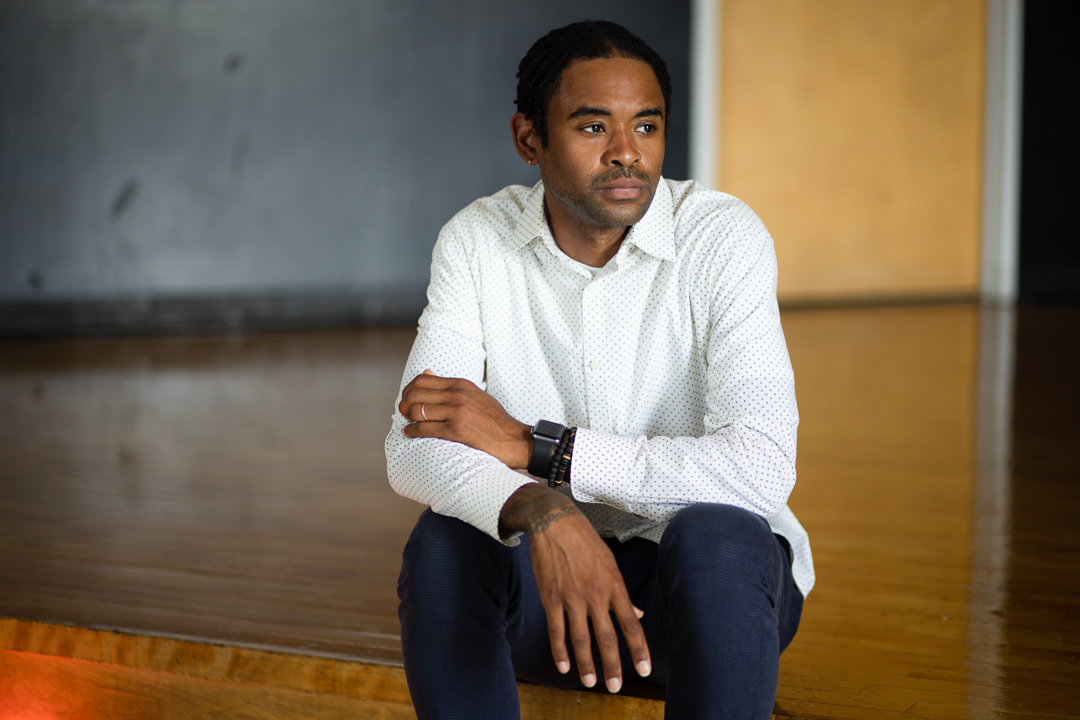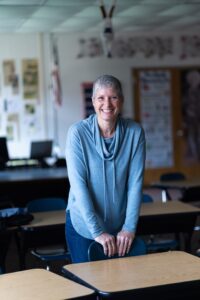My mom taught for 30 years. And after I went to grad school she said, ‘Why don’t you get some experience in the city schools?’ I did it, and I haven’t left. You get really attached to the work and the students, especially once you see them meet the standards that you help them set for themselves.
Coming up here in this city, I’ve seen a lot of people leave because they said there wasn’t opportunity here. Well, we aren’t going to do much about creating opportunity unless some of us stick around. So I stuck around. And I just keep getting fulfilled by seeing the students succeed.
The students don’t really have people that they can look to and say, ‘Hey, I know this person that can do these things.’ So it became a priority for me to create that bridge for them and that example for them. Part of what we do is bring in other teaching artists to say, ‘Hey, these are people from your community.’ That’s a big deal. Seeing that resonate and the impact that that has, and how it can motivate kids, that’s really why I stick around.
We took a group of students from all four of the schools that I work in to the Kennedy Center. And we took a performance piece that I wrote and did the choreography for with a dear friend who was a music teacher here. We took the students through the whole recording process — they got to record themselves and got to experience what that was like, hearing themselves. Immediately, they started self-correcting and self-editing, which is really cool. It’s like learning on the fly, like doing a job.
We organized getting them on planes. Almost all of them had never been on a plane before — had never been outside of this general region (Milwaukee, Madison, Chicago). So we go to D.C., we perform the piece in front of maybe 1,000 people — however many that theater holds. And kids from Hawaii all the way to New York City are a part of this talent show, and they’re all nervous. And by the time they were done with the performance, everybody was on their feet, and the Kennedy Center applauded them. And you know, we told the kids, ‘Y’all represented Milwaukee out there. That’s a big deal. You dedicated yourself to doing this piece.’
The piece was on Frederick Douglass. They got to go to Frederick Douglass’ home in the D.C. area, and they got to see examples of The North Star. We were really seeing that impact on them: others were viewing them outside of how they’re traditionally viewed here in the city. I think that was a very big deal for them; it was for me. It brought tears to many of our eyes that were a part of that trip.
That was a big moment. It was a big moment in our momentum toward our job, which is trying to transform students’ experiences in schools through the arts.
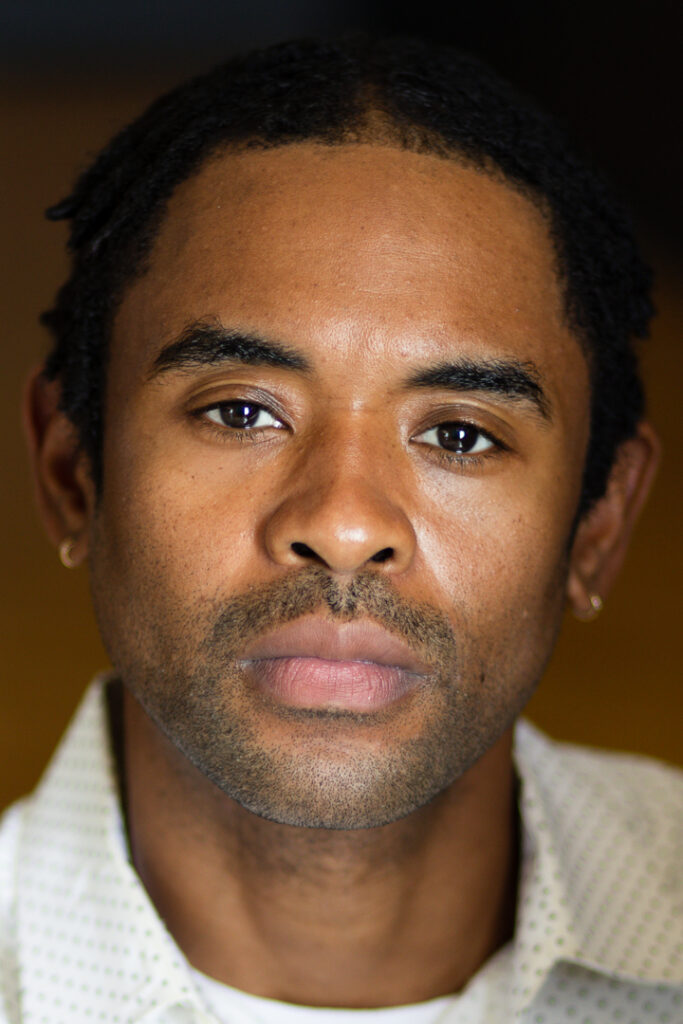
I hope people can better understand the commitment that teachers have in each of those areas that they’re called on: from social work, to social-emotional learning and mental health care, to everything outside of that textbook.
I liken it to police officers in certain ways. They have a job, but a lot of the time in the community, they assist mental health — they are responding to all sorts of issues. It’s not like when there was sort of a defined line between the school and the community. That is non-existent now. So if you’re seeing it on the news, if you’re hearing about it in the neighborhood, chances are that a teacher has already known about it and has been dealing with it because the line is blurred between community and school. So that’s the biggest thing, the fact that teachers are coming back and continue to come back understanding that: ‘What’s going to be required of me is going to go well beyond what’s in my job description.’
I consider myself blessed as an artist because I pour a lot of what I experience into my work. It may not be verbatim, it may not be word-for-word, but it’s an outlet for me. Other teachers have their other ways that they deal with it. But it’s almost like a runner’s high. You go through the gruel. You go through the pain. You go through all of what’s required of you. But when you see the impact that you make on that student, it’s the greatest feeling that you can have. It just is.
Society’s conditioned to think that if you got an A, you succeeded. For us, it’s that student that just lost their mother or lost their father to gun violence and the fact that they made it a full week without breaking down. Advocating for themselves and what they need. Success is when that student has been shut down her entire life, but then she embraces a leading role on stage, and she fills the entire auditorium with her voice. Those are huge successes.
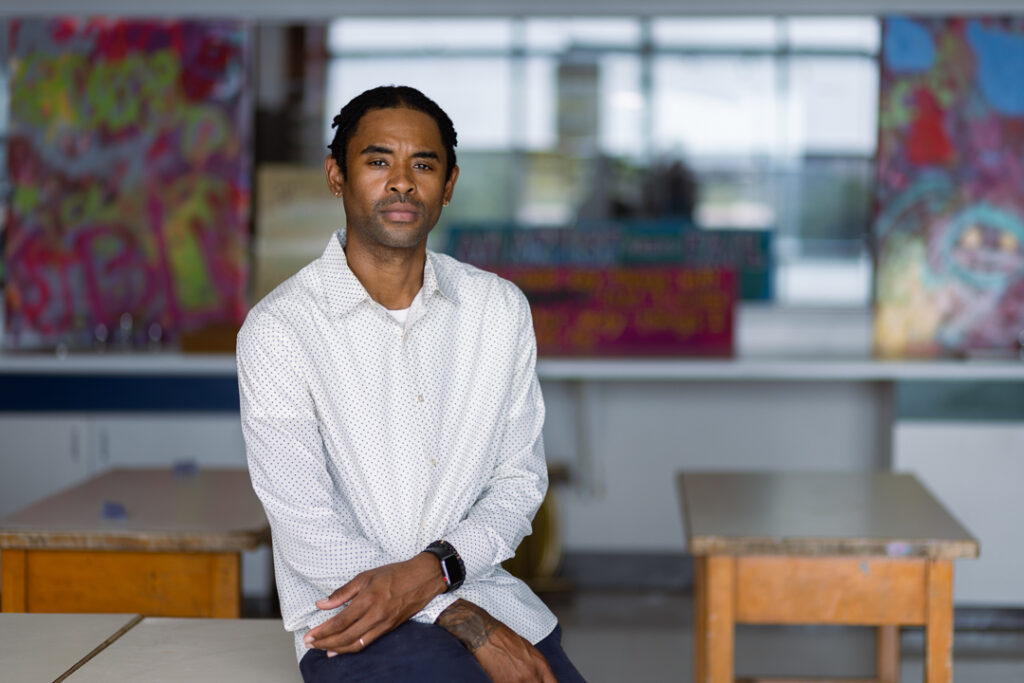
We had a student who’d never done theater before. She was very quiet. She kept to herself a lot. And we are at the point where we assume every child that comes in has experienced some level of trauma. She had hers, without going into detail. But for the most part, just everyday coming to school, you know. And this is when we were getting everyone in the auditorium pre-pandemic to show a trailer for the musical and then revealing what it would be. She kind of came up to me and tugged on my shirt: ‘Hey, I think I might want to do that.’ I was like, ‘Really? Okay. Can you sing something really quick?’ And she would not do it.
I was like, ‘Alright, here’s what we’ll do. Why don’t I give you this book. It’s October and we’re not even gonna get started until January. Why don’t you learn all of these lines and stuff. Look at this character, if that’s what you’re thinking about.’ (It was the star character.) ‘And then you know, I’ll check in with you.’ ‘Alright, that’s fine,’ she said.
I kid you not: that was a Thursday, and that Monday, she came back and said, ‘I think I can sit and do some lines.’ So we went to the auditorium. She blew me away. I mean, she knew every single line. I’m the director who’s gonna direct this thing, and I haven’t really even learned the adaptation that well — so I’m reading my lines, and she’s on stage acting. I said, ‘Whoa, have you done this?’ She’s like, ‘No, not really.’ And then she sings. And she sang so beautifully that I started tearing up.
And then she starts to reveal her story: ‘I really don’t say much, I really don’t talk a lot.’ The pressure of being a young girl in the city sucks. Boys are constantly trying to make their advances on you. At that time, I had a small group and sat in for them to share their stories and get them to understand that that’s where your strength comes from: that you didn’t break because of those things that are happening to you or have happened to you. This is where you belong. And I told her, ‘You can sing like that and you can share that gift, and people need to know about it.’
Those stories… there’s a lot of them that are like that, you know? Students latch on to that outlet.
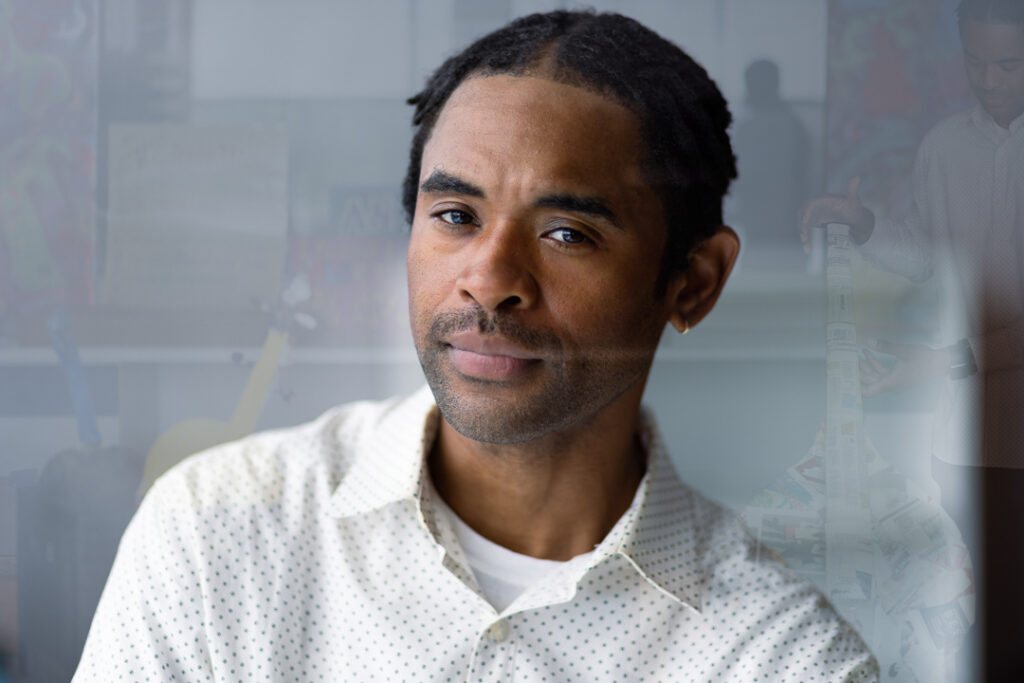
We’ve got to pay teachers what they’re worth. There’s this constant tug-of-war that’s going on. We give money to so many other priorities in society. If we prioritize the health of children and we prioritize their education, I think we have to give directly to teachers, because they are the #1 in front of students.
We also have to listen to teachers. They’re in the classroom eight hours a day spending a lot of time with these students. We have to listen to the ideas and the suggestions that they have to innovate the experiences of the students. In a lot of ways, we’re still modeling these old, tired ways of how we educate. I talked about that blurring of the line between the classroom and the community — our teachers have gone through that. And so it’s important that we listen to our teachers because they’re on the front lines.
I think that it’s those two simple things we need, and I’m hopeful we’re gonna get there. We don’t have a choice. The kids are gonna still keep coming. And if we value the success of children — academically, yes, but in life in general — we’ve got to pay these qualified teachers to come in and fill these roles. Give them the help that they are asking for, so they can concentrate on the whole child.
Teachers are spending a lot of time with children who we fully expect to be future leaders. Children will hold these posts that we talk about, whether it’s in a political sphere, law enforcement, social work, engineering — wherever their professions take them. We shouldn’t whittle down teacher qualifications just so that you can have bodies before children.
Teachers are educating, they’re preparing students academically, they’re preparing them for how to function and be good citizens in society. Everything from financial literacy to all of the things that would make them viable participants and able to survive. You couple that with all of the trauma students are bringing in; they’re not empty vessels by any means. People talk about learning loss, and we can get into semantics, but they’re always learning something, whether it’s good for them or bad for them.

Our kids are always on our minds. That’s a common concern among teachers in the summertime, depending on where you teach: are my students going to make it to next year? There’s the weight of it all. Just like a doctor goes home and may have lost somebody, or may feel limited in what it is that they can do — teachers have that same mentality. So when teachers are asking for extra aides, pay those aides a living wage, because you know how crucial they are to the success and performance of a teacher. Overwhelmingly, teachers are asking for help and support in that social-emotional area. Because when new teachers come in, they’re prepared for the on-paper job, but a lot of times if they’re not from the community, they’re blindsided by all of what comes in the door.
I’ve seen faces in some of these new teacher meetings — you get people who aren’t from the community and don’t understand all of what the student has coming in. It’s definitely a shock. It starts to add up. I’ve got a room with 30 students who all learn differently, who are coming in with so much of their own stuff. You could probably get through a full school year just addressing social-emotional learning before you get to any academics, you really could. So there’s just that juggling. When you figure there’s a counselor or two to a building of 300-some students, every teacher ends up being a counselor.
We’ve got to address the ratio in some of our highly populated schools. And we have to stop minimizing the jobs of assistants. I’d push to get that ratio down based on what the needs are. It may work in other communities and other districts to do 1:10 or 1:20. But when we’re talking about the city, and we’re talking about city issues and city problems, you need two to three full-time teachers in the classroom, where they can collaborate and attack these issues in a more favorable ratio — not just for them, but for the students.
When the ratios are too wild, you lose kids. It cuts a teacher to the core when they’ve got to either turn the student away or give them a piece of themselves where they’re just holding them over or not addressing what it is that they need. So that’s what happens: the teacher becomes frayed. Every student is not getting that 100% ready, restored teacher. They’re just getting a little piece.
So I think the focus has to be on making the teachers accessible to all students in the same way. Because you’ve got students who don’t self-advocate, they just take it. They come in and they don’t really say much. But you want to hear them. And if there’s an issue why they can’t be heard, we want to be able to address that with the same amount of attention we give to that student who is self-advocating. When you can’t do that, you’re talking about mental health issues for the teacher: ‘Am I doing enough?
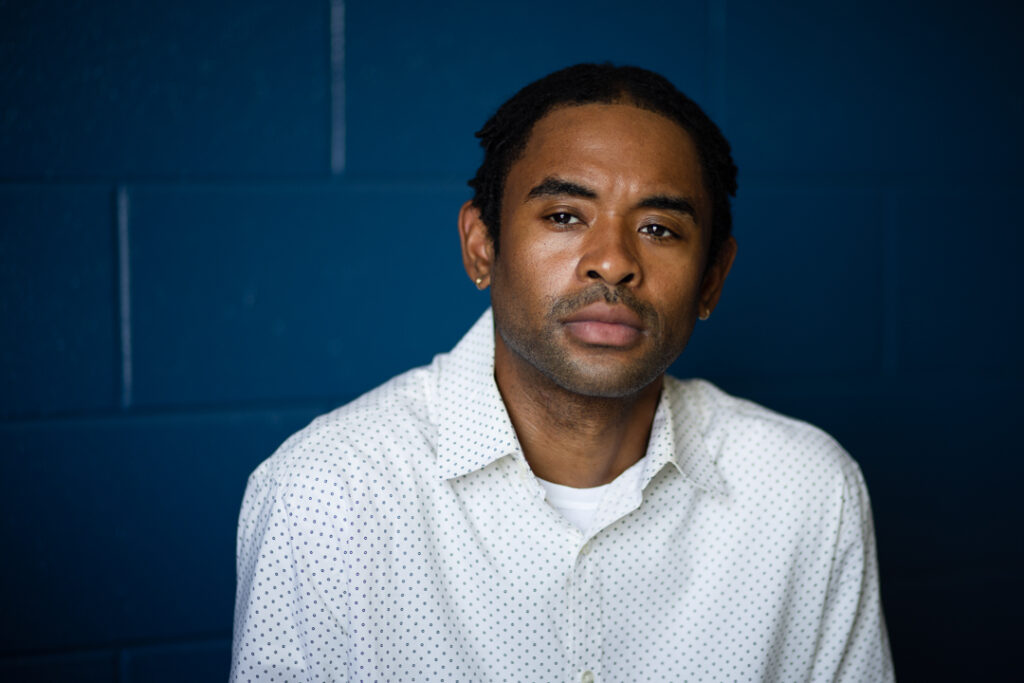
History gives us a lot. Its purpose is to inform us of things that inevitably come up again. When I think of the toughest challenges in our history, we’ve only been able to get past them because people didn’t give up hope. It’s not a matter of ‘we don’t know what the answers are,’ we just need more convincing — we need more advocating for what those solutions can be. And if a young person is led in a direction to where they can add their voice to that chorus, to champion what those changes in education ought to be, it’ll be much, much more helpful than just being aware that there’s an issue and then shutting down. Because when we shut down — those keepers of the status quo, that’s what they want.
You have organizations out there who are fighting on behalf of children and students. And I think we can shift the conversation from teacher-to-school-board or teacher-to-government-agency and refocus it on kids. Whatever decisions or whatever laws, we have to remember this is about children, from kindergarten all the way up to high school. And at the end of the day, we’ve got to be able to say whether we are providing what we need for them in an equitable way, a fair way, a just way — in a way that we can walk away and say we’ve done everything that we possibly can to make sure that these young people are successful.
But you know how easily we can become distracted by some of the most miniscule things. We’ve got to stay focused and keep our eyes on it. And you’re gonna get tired. You’re gonna be frustrated as hell. But you can’t take your eyes off of it. And it’s got to be a laser focus on this kid: lead with the kids, lead with what their needs are first, and devise the plan around them. You gotta lead with the kids.
At some point, we’ve got to stop saying, ‘It’s the system.’ We know, it is, yeah, and we’ve all got to do something.
Get in touch with your alderperson. If you’ve got ideas, let somebody hear them. Those ideas may fall on someone who may be running for office or who may be a principal one day. We need to communicate while the political and bureaucratic stuff is being worked out. If there’s one thing you want to be it’s READY when they come and they ask, ‘Alright, what is it that you want?’ That’s not the time to say, ‘Um, we need to meet, we’ve got to organize!’ You want to have that answer. And you want to be articulate with it.
–Ja’Rahn Leveston
Arts Teacher
Milwaukee, Wisconsin
